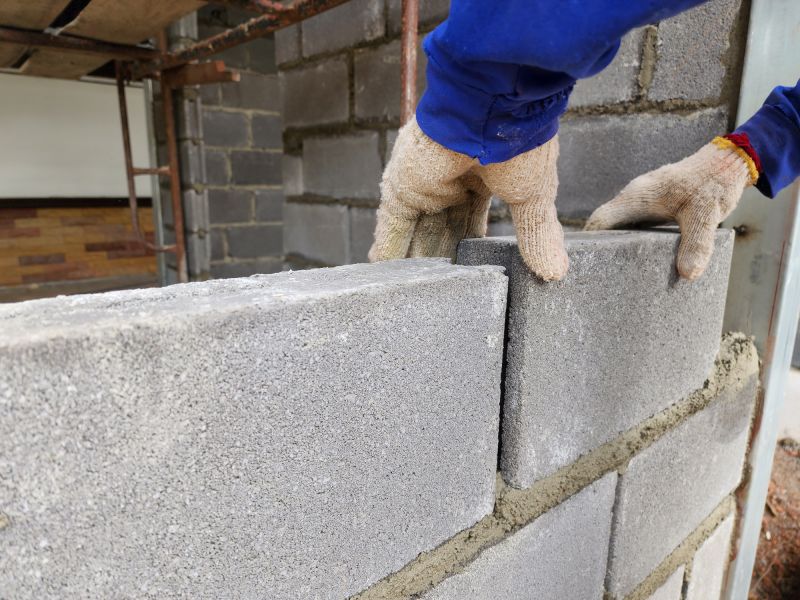Ultimate Guide To Block Wall Repair Products For Homeowners
Learn about the most effective products to tackle block wall cracks, leaks, and structural issues confidently.
 Block wall repairs are a common necessity for maintaining the structural integrity and aesthetic appeal of masonry structures. Whether addressing cracks, chips, or larger damaged sections, selecting the right products is essential for achieving durable and visually appealing results. Repair materials must be compatible with existing masonry, easy to work with, and capable of withstanding environmental conditions. From patching compounds to specialized adhesives, there is a wide range of options designed to cater to various repair needs.
Block wall repairs are a common necessity for maintaining the structural integrity and aesthetic appeal of masonry structures. Whether addressing cracks, chips, or larger damaged sections, selecting the right products is essential for achieving durable and visually appealing results. Repair materials must be compatible with existing masonry, easy to work with, and capable of withstanding environmental conditions. From patching compounds to specialized adhesives, there is a wide range of options designed to cater to various repair needs.
Top Overall Option
Versatile Masonry Repair Compound
This multipurpose repair compound is formulated for use on various masonry surfaces, including concrete blocks. It offers excellent adhesion, ease of application, and weather resistance, making it suitable for both small patches and larger repairs. Its smooth consistency allows for easy shaping and finishing, helping to create a seamless repair that blends with existing masonry.
Types of Products For Block Wall Repairs
Mortar Mixes
Pre-mixed or dry mortar blends designed for patching and rebuilding sections of masonry walls, providing structural stability and aesthetic consistency.
Concrete Patches
Ready-to-use patches formulated for filling larger holes and cracks, offering durability and weather resistance.
Polyurethane Sealants
Flexible sealants ideal for sealing cracks and preventing water infiltration while accommodating slight movement.
Hydraulic Cement
Specialized cement that expands as it sets, perfect for stopping active leaks and repairing structural cracks.
Epoxy Adhesives
High-strength adhesives used for bonding broken or loose masonry pieces securely back into place.
Liquid Masonry Waterproofing
Coatings applied to exterior surfaces to provide waterproofing and prevent future damage.
Polymer-Based Fillers
Flexible fillers suitable for minor cracks and chips, offering good adhesion and weather resistance.
Repair Trowels and Tools
Essential tools for applying, shaping, and finishing repair compounds and mortar mixes.
Bonding Agents
Primers or bonding agents that improve adhesion between old and new mortar or patching materials.
Grout and Joint Compounds
Materials used to fill joints and seams, ensuring a tight and weather-resistant finish.
Popular Choices
Convenient sealants that can be applied directly from the tube to seal cracks and small holes quickly.
Fast-curing patches suitable for urgent repairs on damaged masonry surfaces.
Products designed to fill and seal cracks while accommodating slight movement in the wall.
Widely used for stopping active leaks and sealing cracks in masonry walls.
Complete kits that include epoxy adhesives and applicators for repairing broken masonry elements.
Protective coatings that help shield walls from moisture and weather-related damage.
Fillers that remain flexible after curing, ideal for areas with ground or temperature movement.
Tools that facilitate precise application and finishing of repair compounds.
Primers that enhance adhesion between old and new masonry materials.
Materials used to seal joints and prevent water ingress, ensuring a long-lasting repair.
Proper preparation is key to successful block wall repairs. Cleaning the damaged area thoroughly to remove dirt, loose debris, and deteriorated mortar ensures better adhesion of repair materials. For cracks and small holes, sealants and patching compounds are often sufficient, providing a quick and effective fix. Larger repairs may require mortar mixes or concrete patches that can be shaped and smoothed to blend seamlessly with the existing wall.
Durability and longevity depend heavily on selecting products that match the specific type of masonry and environmental exposure. For outdoor walls, weather-resistant and waterproof formulations are recommended to prevent future damage from moisture infiltration. Additionally, some repair products include additives to improve adhesion, flexibility, and crack resistance, which can be beneficial in areas prone to temperature fluctuations or ground movement.
Incorporating the right tools and following manufacturer instructions can significantly enhance the quality of the repair. Trowels, putty knives, and brushes are commonly used to apply and shape repair materials. Proper curing time and finishing techniques also contribute to a seamless and durable repair, helping to restore the wall's strength and appearance over time.
Key Buying Considerations
- Identify the type and extent of damage to determine the appropriate repair product.
- Choose materials compatible with the existing masonry surface and type.
- Consider whether the repair is indoors or outdoors to select weather-resistant formulations.
- Evaluate the curing time required for different products to plan your repair schedule.
- Determine if flexibility is needed in the repair material to accommodate movement or settling.
- Assess the ease of application, especially if DIY repair is intended.
- Check for water resistance features if the wall is exposed to moisture or rain.
- Select products that match the color and texture of the existing wall for seamless blending.
- Review manufacturer instructions for surface preparation and application techniques.
- Consider the longevity and durability of the repair material based on environmental conditions.
- Look for products that offer good adhesion to prevent future delamination.
- Verify if the product is suitable for repairing structural cracks or just surface damage.
- Assess the need for additional tools or accessories, such as trowels or primers.
- Check for any specific safety precautions or ventilation requirements during application.
- Read customer reviews and ratings to gauge real-world performance and satisfaction.
This page contains affiliate links. We may earn a commission if you make a purchase through these links, at no additional cost to you.
